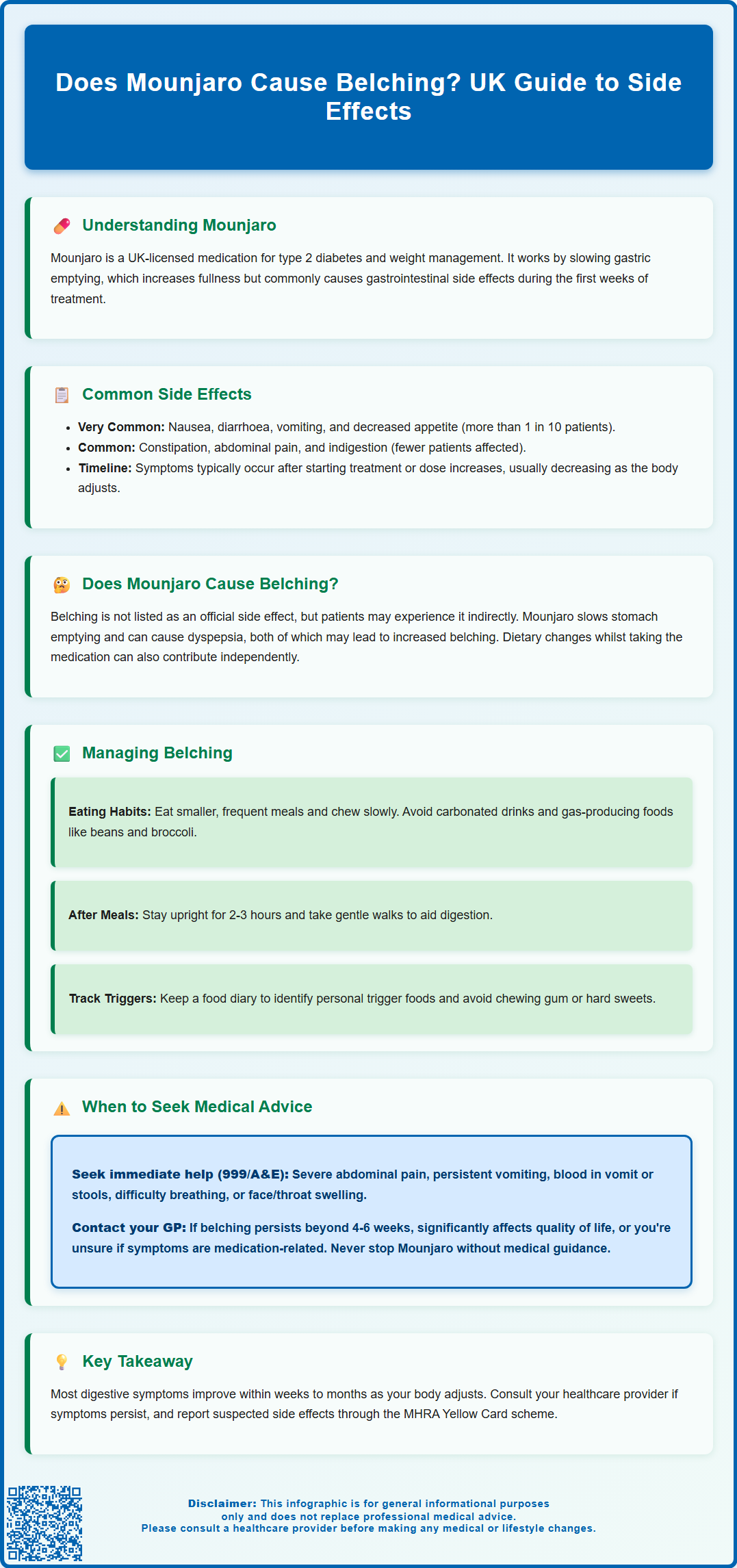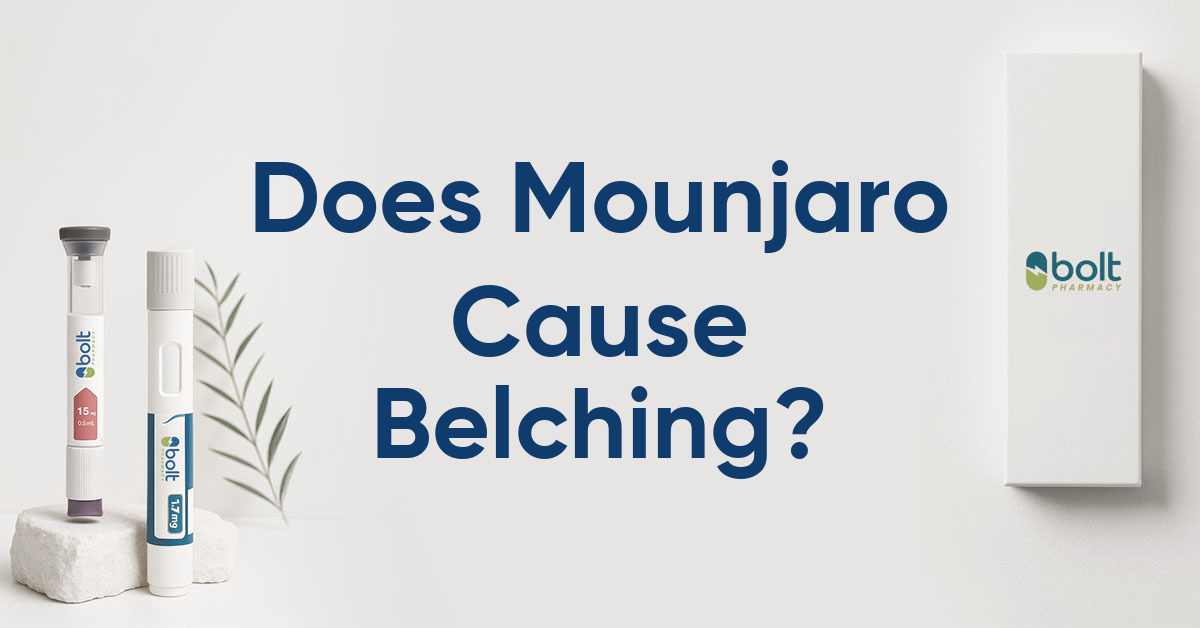Does Mounjaro cause belching? Belching is not listed as a common side effect in official UK prescribing information for Mounjaro (tirzepatide), but some patients report experiencing it during treatment. Mounjaro is a dual GIP and GLP-1 receptor agonist licensed for type 2 diabetes and weight management. Its mechanism of slowing gastric emptying can indirectly contribute to digestive symptoms including belching, dyspepsia, and bloating. Understanding the relationship between Mounjaro and gastrointestinal effects helps patients manage symptoms effectively whilst benefiting from this medication's metabolic and weight management properties.
Summary: Belching is not officially listed as a common side effect of Mounjaro, but may occur indirectly due to delayed gastric emptying and associated dyspepsia.
- Mounjaro (tirzepatide) is a dual GIP and GLP-1 receptor agonist licensed in the UK for type 2 diabetes and weight management.
- The medication slows gastric emptying, which can indirectly contribute to belching, bloating, and reflux symptoms.
- Common gastrointestinal side effects include nausea, diarrhoea, vomiting, and dyspepsia, typically most prominent during initial treatment.
- Dietary modifications such as smaller meals, avoiding carbonated drinks, and eating slowly may help reduce belching.
- Seek medical advice if belching accompanies severe abdominal pain, persistent vomiting, or signs of pancreatitis or dehydration.
Table of Contents
Understanding Mounjaro and Gastrointestinal Side Effects
Mounjaro (tirzepatide) is a prescription medication licensed in the UK for the treatment of type 2 diabetes mellitus and, more recently, for weight management in adults with obesity (BMI ≥30 kg/m²) or overweight (BMI ≥27 kg/m²) with weight-related comorbidities. As a dual glucose-dependent insulinotropic polypeptide (GIP) and glucagon-like peptide-1 (GLP-1) receptor agonist, Mounjaro works by mimicking naturally occurring incretin hormones that regulate blood glucose levels and appetite.
The mechanism of action involves slowing gastric emptying, which means food remains in the stomach for longer periods. This delayed gastric emptying contributes to increased satiety and improved glycaemic control but also explains why gastrointestinal side effects are among the most commonly reported adverse reactions with Mounjaro. The medication also stimulates insulin secretion in a glucose-dependent manner and reduces glucagon secretion, further supporting metabolic control.
Gastrointestinal symptoms are well-documented with GLP-1 receptor agonists and dual agonists like Mounjaro. According to the UK Summary of Product Characteristics (SmPC), the most frequently reported digestive side effects include:
-
Nausea (very common, affecting more than 1 in 10 patients)
-
Diarrhoea (very common)
-
Vomiting (very common)
-
Constipation (common)
-
Abdominal pain or discomfort (common)
-
Dyspepsia (indigestion) (common)
-
Decreased appetite (very common)
These effects typically occur most prominently during the initial weeks of treatment or following dose escalation, and often diminish over time as the body adapts to the medication. Understanding this broader context of gastrointestinal effects is essential when considering specific symptoms such as belching or eructation.

Does Mounjaro Cause Belching?
Belching (eructation) is not specifically listed among the common adverse effects in the official Mounjaro Summary of Product Characteristics (SmPC) approved by the MHRA. However, this does not mean patients cannot experience belching whilst taking the medication. The relationship between Mounjaro and belching may be indirect rather than a direct pharmacological effect.
Several mechanisms may explain why some patients report increased belching when taking Mounjaro:
Delayed gastric emptying is a primary factor. As Mounjaro slows the movement of food through the digestive system, this can affect the gastro-oesophageal junction function and potentially lead to increased reflux episodes, which may present with belching. The sensation of fullness from delayed emptying may also trigger more frequent swallowing of air (aerophagia).
Dyspepsia and indigestion, which are recognised side effects of Mounjaro, often present with belching as an associated symptom. Patients experiencing upper abdominal discomfort, bloating, or a sensation of fullness may naturally experience more frequent eructation as the body attempts to relieve pressure or discomfort.
Dietary changes accompanying Mounjaro treatment may also contribute. Many patients modify their eating habits due to reduced appetite or as part of a weight management programme. Changes in food types, eating speed, or meal composition can influence air swallowing and belching frequency.
While clinical trials and post-marketing data have not established belching as a common direct side effect of tirzepatide, individual experiences vary. If you are experiencing persistent or troublesome belching whilst taking Mounjaro, this warrants discussion with your healthcare provider to rule out other potential causes and ensure appropriate management.
Managing Belching While Taking Mounjaro
If you experience belching whilst taking Mounjaro, several practical strategies may help reduce this symptom and improve your overall comfort during treatment:
Dietary modifications can be particularly effective:
-
Eat smaller, more frequent meals rather than large portions, which can overwhelm the already-slowed digestive system
-
Chew food thoroughly and eat slowly to reduce air swallowing (aerophagia), a common cause of belching
-
Avoid carbonated beverages, which introduce additional gas into the digestive system
-
Limit gas-producing foods such as beans, lentils, cruciferous vegetables (broccoli, cauliflower, cabbage), onions, and certain fruits
-
Reduce fatty or fried foods, which take longer to digest and may exacerbate delayed gastric emptying
-
Identify personal trigger foods through a food diary, as individual tolerances vary
Lifestyle adjustments may also prove beneficial:
-
Avoid lying down immediately after eating; remain upright for at least 2-3 hours after meals
-
Take a gentle walk after eating to encourage digestive motility
-
Avoid chewing gum or sucking on hard sweets, as these activities increase air swallowing
-
Manage stress, as anxiety can affect digestive function and increase aerophagia
-
Stay well-hydrated throughout the day, but avoid drinking large amounts of fluid with meals
Medication timing should be discussed with your healthcare provider. Mounjaro is administered once weekly, and maintaining consistent weekly dosing is important. While some patients report variations in side effects based on timing, there is limited evidence that changing injection time alone significantly reduces gastrointestinal effects. Never adjust your dose or frequency without medical guidance.
If belching persists despite these measures, your GP or diabetes specialist nurse may recommend over-the-counter remedies such as simeticone (an anti-foaming agent) or alginates for reflux-related symptoms. Your pharmacist can advise on suitable products. Most gastrointestinal side effects improve within the first few weeks to months of treatment as your body adjusts to Mounjaro.
When to Seek Medical Advice About Digestive Symptoms
While belching alone is generally not a cause for immediate concern, certain warning signs indicate that you should contact your GP or healthcare team promptly:
Seek medical advice if you experience:
-
Severe or persistent abdominal pain, particularly if it is sharp, localised, or worsening
-
Persistent nausea and vomiting that prevents you from keeping down food, fluids, or other medications
-
Signs of dehydration, including dark urine, dizziness, dry mouth, or reduced urination
-
Blood in vomit or stools, or black, tarry stools
-
Unexplained weight loss beyond what is expected with treatment
-
Difficulty swallowing or pain when swallowing
-
Symptoms of pancreatitis: severe upper abdominal pain radiating to the back, often accompanied by nausea and vomiting (Mounjaro should be discontinued immediately if pancreatitis is suspected)
-
Symptoms of gallbladder disease: pain in the upper right abdomen, particularly after eating fatty meals, possibly with fever or jaundice
-
Signs of bowel obstruction: severe bloating, inability to pass wind or stools, vomiting
Contact your healthcare provider for routine review if:
-
Belching or other digestive symptoms persist beyond 4-6 weeks despite self-management strategies
-
Symptoms significantly impact your quality of life or ability to maintain adequate nutrition
-
You are uncertain whether symptoms are related to Mounjaro or might indicate another condition
-
You wish to discuss dose adjustment or alternative treatment options
NICE guidance recommends regular monitoring for patients taking GLP-1 receptor agonists, including assessment of tolerability and side effects. Your healthcare team should review your response to treatment, including any adverse effects, at appropriate intervals. Do not discontinue Mounjaro without medical guidance, as abrupt cessation may affect your diabetes control or weight management progress.
For urgent concerns when your GP practice is closed, contact NHS 111 for advice. Any suspected side effects can also be reported through the MHRA Yellow Card scheme (yellowcard.mhra.gov.uk).
If you experience severe allergic reactions (difficulty breathing, swelling of face or throat, severe rash), this constitutes a medical emergency requiring immediate attention via 999 or attendance at A&E.
Frequently Asked Questions
Is belching a common side effect of Mounjaro?
Belching is not listed as a common side effect in the official UK Summary of Product Characteristics for Mounjaro. However, it may occur indirectly due to delayed gastric emptying or associated dyspepsia, which are recognised effects of the medication.
How can I reduce belching whilst taking Mounjaro?
Eating smaller, more frequent meals, chewing food thoroughly, avoiding carbonated beverages, and limiting gas-producing foods can help reduce belching. Remaining upright after meals and avoiding chewing gum may also be beneficial.
When should I contact my GP about digestive symptoms on Mounjaro?
Contact your GP if you experience severe or persistent abdominal pain, persistent vomiting preventing fluid intake, signs of dehydration, blood in vomit or stools, or symptoms of pancreatitis such as severe upper abdominal pain radiating to the back.
The health-related content published on this site is based on credible scientific sources and is periodically reviewed to ensure accuracy and relevance. Although we aim to reflect the most current medical knowledge, the material is meant for general education and awareness only.
The information on this site is not a substitute for professional medical advice. For any health concerns, please speak with a qualified medical professional. By using this information, you acknowledge responsibility for any decisions made and understand we are not liable for any consequences that may result.
Heading 1
Heading 2
Heading 3
Heading 4
Heading 5
Heading 6
Lorem ipsum dolor sit amet, consectetur adipiscing elit, sed do eiusmod tempor incididunt ut labore et dolore magna aliqua. Ut enim ad minim veniam, quis nostrud exercitation ullamco laboris nisi ut aliquip ex ea commodo consequat. Duis aute irure dolor in reprehenderit in voluptate velit esse cillum dolore eu fugiat nulla pariatur.
Block quote
Ordered list
- Item 1
- Item 2
- Item 3
Unordered list
- Item A
- Item B
- Item C
Bold text
Emphasis
Superscript
Subscript










